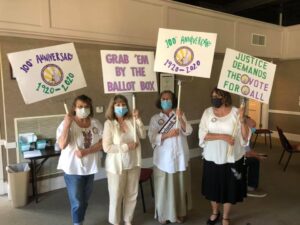Last year, in 2020, my Texas county celebrated the 100th anniversary of the 19th Amendment guaranteeing women’s right to vote. “Hard Won Not Done” was our motto, and little did we know how true that summary would be here again in 2021.
In spite of the reality that Republicans won up and down the ballot in Texas last year, and that mostly Republican officials followed the rules, oversaw the process, confirmed its integrity, and certified the election results, polls reveal that a majority of Republicans believe our electoral process is insecure. Consequently, politicians in Austin currently are debating Senate Bill 7 and House Bill 6, legislation that is intended to tighten the rules and make it harder for eligible Texans to vote.
Republicans won. I scratch my head. What are they afraid of?
Michael Waldman, president of the nonpartisan Brennan Center for Justice, spoke to this paradox. “It’s like a perpetual motion machine — you create the fear of fraud out of vapors and then cut down on people’s votes because of the fog you’ve created. Politicians, for partisan purposes, lied to supporters about widespread fraud. The supporters believe the lies, and then that belief creates this rationale for the politicians to say, ‘Well, I know it’s not really true, but look how worried everybody is.’”
I think this analysis is right on. I think we are being played by politicians who want to hang on to their power by any means necessary. I think the campaign to convince us that our electoral system needs repair gives these politicians opportunity to declare there is a problem that doesn’t exist so they can fix it. “Fix it,” indeed.
I ask again, what are they afraid of? If a party platform projects a version of the world that appeals to most voters, then that party has a decent chance of winning elections, right? So why aren’t Republicans in Austin talking about fixing our power grid or fixing homelessness, rural broadband access, or child poverty? That’s a vision of Texas that would appeal to many of us.
Instead, they are wasting precious time and energy aiming to “fix” future elections by making it harder for voters to vote. Why else would they try to limit voting by mail, curbside ballots, and drop boxes? To limit the authority of local election officials to decide how best to administer fair elections in their own counties? To make it harder for eligible voters to get registered to vote? Politicians attempting to “fix” a system that is not broken sounds like a scam to me.
As I’ve been asking myself these questions, evidence has emerged that the right-wing Heritage Action is behind many of the efforts across several states to draft and push this current wave of voter legislation. Paul Weyrich founded the powerful, well-funded Heritage Foundation in 1973. Speaking to a group of evangelicals in 1980 in Dallas, Weyrich made his voting philosophy quite clear: “I don’t want everybody to vote. Elections are not won by a majority of the people . . . As a matter of fact, our [Republican] leverage in the elections quite candidly goes up as the voting populace goes down.”
Ah-ha, now I get it. Understanding this decades-long history of voter suppression answers my questions and spurs my passion that our “hard won” democratic advances must not be derailed. Join me in writing to our state representatives to demand authentic “integrity” in our elections process.
Find out more about the Brennan Center for Justice here.
A recent Texas Tribune article presents an analysis of Texas’s voting laws in 2020 that concludes it is harder to cast a ballot in Texas than in any other state across the country.
Listen to Bill Moyers’ interview with Paul Weyrich in 1980 here and Moyers’ discussion with Anne Nelson about the the ongoing efforts to suppress voter participation in the podcast “The Shadow Network” here.
Numerous articles document the work of Heritage Foundation as they advise state legislatures across the country to develop new voter rules. Here is one from the New York Times.

Excellent, accurate and to the point. “Stop the steal” should be about stopping Republicans from stealing the right to vote.
Suppression of voting is easy when you decide who you do Not want to vote and inhibit the times and places those people are likely to cast votes. It is clearly disenfranchisement.